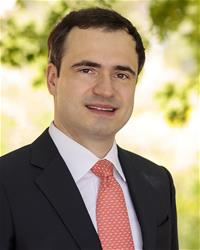Sep 8, 2020
Taxing transformations — how low taxes drive high-tech investment.
Originally from Germany, Benjamin Osswald fell in love with South Korea during a study abroad program. That’s where he met his wife, discovered his love of Asian cuisine, and landed a job at Samsung, where he provided accounting valuations for one of the world’s leading tech firms. The latter is impressive, especially when you consider how little he knew of the language at the time. “Their meetings were almost all in Korean, so you pick it up pretty quickly,” explained Osswald, the new instructor of accounting at Gies. “Otherwise, you’re lost.”
That’s a sensation common to many students first encountering the complex world of taxes. But Osswald hopes to change that by sharing his passion for the subject, which developed during his time at Samsung. “There was a lot of valuation of new technologies, and there was always the question of where to invest and what is the best deal that we can get in terms of taxes,” he said. “I learned how tax policies impact investment decisions, especially when it comes to recruiting skilled labor, which is very, very important.”
 Since earning a PhD in international business taxation at the Vienna University of Economics and Business in Austria, Osswald (left) has focused much of his research exploring questions in this area. Do tax subsidies work? Is there a difference between how multinational companies and domestic firms respond to the same incentives? These are important questions for governments, because tax incentives are expensive and they need to know if they work.
Since earning a PhD in international business taxation at the Vienna University of Economics and Business in Austria, Osswald (left) has focused much of his research exploring questions in this area. Do tax subsidies work? Is there a difference between how multinational companies and domestic firms respond to the same incentives? These are important questions for governments, because tax incentives are expensive and they need to know if they work.
One issue he’s currently exploring is the effectiveness of intellectual property boxes. These special tax regimes, provided in Europe, offer substantially reduced corporate tax rates on income derived from intellectual property. On that front at least, it seems that they’re more effective at luring domestic companies than multinational firms who have other options. But they do show returns. In the Belgium regime, for example, a 1-2% decrease in corporate tax revenue was offset by 1-3% improvement in patent applications and a 5% gain in research and development employees.
Another study is exploring whether countries can help companies in crisis by offering tax refunds to those experiencing a large financial loss. That research could be particularly useful now for companies seeking to recover from the recent global shutdown. For stable countries with reliable institutions, it’s an idea that seems to have merit; however, for countries with high debt or a financial crisis, it’s a different story.
“If some countries do that, it will work,” said Osswald. “Companies will really respond and invest, especially in risky projects and innovation. But if you really cannot credibly tell your taxpayers that you’re going to refund them, you should maybe think about spending your money in other ways, like directly giving them the money for R&D, for example.”
After wrapping up a second PhD in accounting at Wisconsin School of Business, Osswald will be teaching the principles of taxation at Gies. The course serves as an important first step for undergraduates who have some knowledge in accounting, but need to understand the difference between tax and financial accounting. He plans to make the class relevant to students by helping them understand how taxes shape their daily lives, from their online purchases to how their choice of job location can affect their bottom line.
Osswald says he was drawn to Gies from the moment he first attended the school’s bi-annual tax symposium in Chicago. He liked the faculty, the history of the program, the breadth of the school’s resources, and the vast array of collaboration opportunities. Discovering a really good sushi restaurant during his interview was also an added plus. “I just felt that this is the place I want to be,” he said. “And it worked out really well.”
